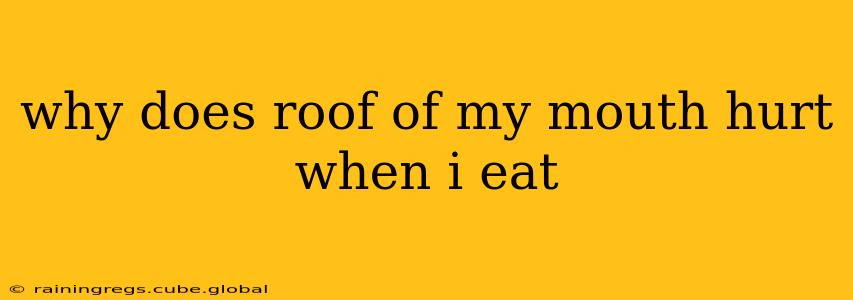A burning or painful sensation on the roof of your mouth while eating can be quite uncomfortable and disruptive. This isn't uncommon, and several factors can contribute to this irritating problem. Let's explore some of the most common causes and what you can do about them.
Common Causes of Roof of Mouth Pain While Eating
Several issues can cause pain on the roof of your mouth when eating. These range from minor irritations to more serious underlying conditions.
1. Minor Irritation and Injuries:
- Hot Foods and Drinks: This is perhaps the most common cause. Scalding your palate on something too hot can leave it sensitive and painful for hours or even days.
- Sharp Food Particles: Hard bits of food like popcorn kernels, nutshells, or bone fragments can scratch or cut the delicate tissue on the roof of your mouth.
- Acid Reflux (GERD): Stomach acid traveling back up the esophagus can irritate the soft tissues of the mouth, including the palate. This often manifests as a burning sensation.
- Mouth Ulcers (Canker Sores): These small, painful sores can develop anywhere in the mouth, including the palate. They're often triggered by stress, injury, or hormonal changes.
- Dry Mouth (Xerostomia): A lack of saliva makes the mouth's tissues more susceptible to injury and discomfort. Dry mouth can be caused by medications, dehydration, or medical conditions.
2. More Serious Conditions:
- Oral Thrush (Candidiasis): This fungal infection can cause a white, creamy coating on the tongue, palate, and inner cheeks. It's accompanied by pain and sometimes a burning sensation.
- Burning Mouth Syndrome (BMS): This chronic condition causes a persistent burning sensation in the mouth, often without any visible sores or lesions. The cause isn't fully understood.
- Allergic Reactions: Certain foods can trigger an allergic reaction, leading to inflammation and pain in the mouth.
- Certain Medical Conditions: Some underlying medical conditions, such as vitamin deficiencies or autoimmune diseases, can manifest as oral pain.
What to Do if the Roof of Your Mouth Hurts When Eating
The treatment depends heavily on the underlying cause. However, here are some general tips:
- Avoid Irritants: Temporarily avoid hot foods, spicy foods, acidic foods, and anything that you suspect might be irritating your palate.
- Rinse Your Mouth: Gently rinse your mouth with warm salt water several times a day to help soothe irritation and promote healing. Avoid harsh mouthwashes containing alcohol.
- Stay Hydrated: Drinking plenty of water helps keep your mouth moist and prevents dryness.
- Over-the-Counter Pain Relief: Topical pain relievers like anbesol can help numb the pain and provide temporary relief.
- See a Doctor or Dentist: If the pain is severe, persistent, or accompanied by other symptoms (fever, swelling, etc.), consult a doctor or dentist for proper diagnosis and treatment. They can determine the underlying cause and recommend the appropriate course of action.
How Can I Prevent Roof of Mouth Pain?
Prevention involves reducing the risk factors. This includes:
- Eating Slowly and Carefully: Chew your food thoroughly to avoid biting down on hard particles.
- Cooling Down Hot Foods and Drinks: Allow hot foods and drinks to cool down before consuming them.
- Maintaining Good Oral Hygiene: Brush and floss your teeth regularly to prevent infections and maintain a healthy oral environment.
- Managing Acid Reflux: If you have GERD, work with your doctor to manage your condition effectively.
Frequently Asked Questions (FAQs)
Q: Can stress cause pain on the roof of my mouth?
A: While stress itself doesn't directly cause pain on the roof of your mouth, it can exacerbate existing conditions like mouth ulcers or burning mouth syndrome, potentially increasing pain sensitivity.
Q: What home remedies can help soothe a painful roof of mouth?
A: Warm salt water rinses, applying a cool compress to the affected area, and consuming soothing foods and drinks (like yogurt or chamomile tea) can provide relief. However, for persistent pain, consult a healthcare professional.
Q: When should I see a doctor about pain on the roof of my mouth?
A: Seek medical attention if the pain is severe, persistent (lasting more than a week), accompanied by fever, swelling, bleeding, or other concerning symptoms. Also consult a doctor if home remedies don't provide relief.
Remember, this information is for general knowledge and doesn't constitute medical advice. Always consult a healthcare professional for any health concerns.
